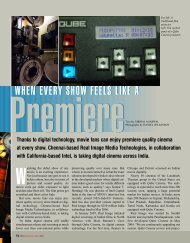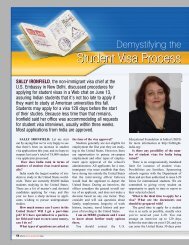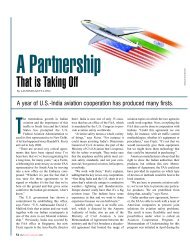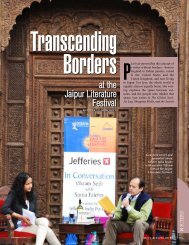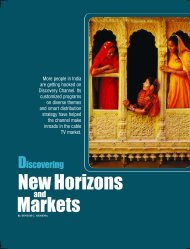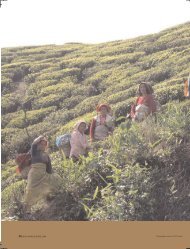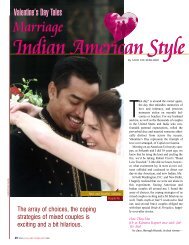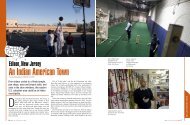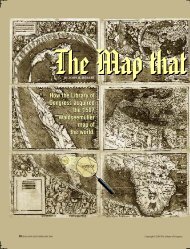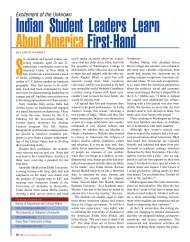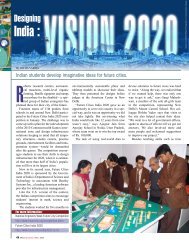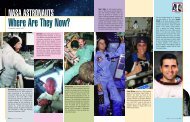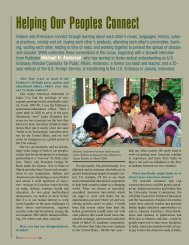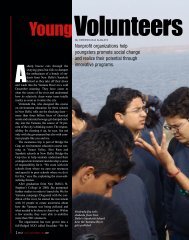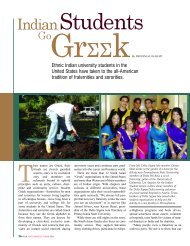You also want an ePaper? Increase the reach of your titles
YUMPU automatically turns print PDFs into web optimized ePapers that Google loves.
<strong>American</strong><br />
<br />
<strong>Diplomats</strong><br />
with<br />
By LAURINDA KEYS LONG<br />
<strong>American</strong>s with Indian roots are filling U.S. government posts all across<br />
the country where they or their forefathers were born, using their<br />
cultural knowledge and language skills—or phrases and stories their<br />
grandmothers taught them—to increase understanding. As they’ve<br />
worked to issue visas, organize cultural programs, develop<br />
trade, health, economic development and political<br />
cooperation, these diplomats have also had a chance to<br />
reconnect. They’ve visited their old schools,<br />
ancestral villages, introduced their children to distant<br />
relatives, even gotten married in a mix of Indian<br />
and <strong>American</strong> style. And they’ve all enjoyed<br />
sharing their experience of America as a<br />
land of opportunity and diversity.<br />
40 SPAN SEPTEMBER/OCTOBER 2005<br />
The boy, Anis Ahmad, and his<br />
father, Hafiz Muhammad Siddiq,<br />
seated at far right with other<br />
Indian and British government<br />
officers at New Delhi’s Red Fort<br />
in 1946, are forefathers of U.S.<br />
Counselor for Cultural Affairs<br />
Adnan Siddiqi. (See page 42.)
Immigrants’ son comes back as diplomat: That story<br />
can only be told in America,” says VINAY<br />
CHAWLA, 29, a consular officer in New Delhi.<br />
“My parents were the byproducts of Partition,” says<br />
Chawla. The two families fled Pakistan and landed in<br />
neighboring villages in what is now Haryana. After<br />
their marriage Chawla’s parents moved to Pittsburgh,<br />
Pennsylvania. “They went for what everyone goes<br />
to America for, a better opportunity, having a stake in<br />
society, making your own way,” says Chawla, adding<br />
that in the 1960s and 1970s, when his parents<br />
emigrated, opportunities to “control your own destiny”<br />
were rare in India, although “it is changing now.”<br />
Chawla’s father had earned a PhD in chemistry from<br />
the Indian Institute of Technology (IIT) in Kanpur.<br />
“Before that, no one in the family had gone to college<br />
or university,” says Chawla. “One of my uncles still<br />
runs a sweet shop. My dad worked there when he was<br />
young. He made burfee in huge vats of sugar.”<br />
Having grown up on blander <strong>American</strong> flavors,<br />
Chawla says he finds the Indian candy too sweet. He<br />
did live in New Delhi for a time as a child, when his<br />
father taught at IIT, Delhi. Chawla studied Hindi for<br />
six months during his Foreign Service training and<br />
progressed well because of his exposure to the<br />
language when he was young. He picked up<br />
even more working at the visa window in the<br />
Embassy in New Delhi. His only problem,<br />
Chawla says, is “when an Indian <strong>American</strong><br />
comes to the window and says, ‘I’d like to<br />
speak to an <strong>American</strong> officer,’ and when I tell<br />
him I am, he demands, ‘Show me your<br />
passport.’ ”<br />
Chawla’s wife, Ritu, who worked in New<br />
Delhi as a TV journalist, was born in Chicago,<br />
where the two met at Northwestern University.<br />
“There was no arrangement,” he says. “For<br />
that I’m thankful for being <strong>American</strong>. From<br />
different castes, different parts of India, if we<br />
had lived in India and followed cultural norms<br />
we wouldn’t have gotten together.”<br />
It’s easy for the Chawlas to fit in India, he<br />
says, until they betray <strong>American</strong> cultural<br />
habits. “We always are the first to show up at<br />
any party and people say, ‘It must be the<br />
<strong>American</strong>s.’ ”<br />
The Chawlas were married in India. “It was<br />
a Hindu wedding, but very <strong>American</strong>: short<br />
ceremony, efficient crowd control. But we did<br />
have elephants and horses and it started late<br />
and ended late,” he says. “There were uncles<br />
Right: Vinay Chawla at the U.S. Embassy.<br />
VINAY CHAWLA<br />
LAURINDA KEYS LONG<br />
from two generations back, with long mustaches, and<br />
embassy officials in suits. I was proud to see all these<br />
categories come together.”<br />
He laughs recalling the offer from their parents:<br />
“We’ll come and take care of everything.”<br />
Instead, he says, “They had no idea how to get<br />
things done, they had to learn how to negotiate from<br />
us. Our parents had become too <strong>American</strong>. They<br />
expected to find a wedding planner and the Yellow<br />
Pages,” an <strong>American</strong> phone directory listing stores and<br />
services by category and location.<br />
Chawla said one of his most gratifying jobs has been<br />
interviewing people in the last step of the immigration<br />
process. “I enjoy telling them they’re on their way to<br />
becoming an <strong>American</strong> citizen,” he says.<br />
The greatest reward is one he did not anticipate. “I<br />
can explain America in a way that may not be accepted<br />
coming from another <strong>American</strong>. I can tell them, `You<br />
can’t say it’s not a country that gives everyone a<br />
chance. I’m a living example.’ ” <br />
“What everyone goes to America for, a<br />
better opportunity, having a stake in society,<br />
making your own way.”
ADNAN SIDDIQI<br />
U<br />
.S. government-funded<br />
Fulbright scholarships,<br />
which bring people from<br />
other nations to study at<br />
<strong>American</strong> universities and<br />
send <strong>American</strong> scholars<br />
abroad, have played a role in<br />
the family histories of many of<br />
the <strong>American</strong> officers in India.<br />
For ADNAN SIDDIQI, the<br />
U.S. Counselor for Cultural<br />
Affairs, the story has come full<br />
circle. It was a Fulbright that<br />
brought his Indian-born father<br />
to the United States from<br />
Pakistan in the 1960s. Now<br />
Siddiqi is chairman of the<br />
board of USEFI (the United<br />
States Education Foundation in<br />
India), which administers the<br />
“I feel connected to<br />
both countries,<br />
India and Pakistan.<br />
It was all one<br />
country.”<br />
Above: The 1946 photo of<br />
his father and grandfather<br />
in Adnan Siddiqi’s office.<br />
Right: Anis Ahmad Siddiqi<br />
of New York, visiting his<br />
granddaughter, Nilofer, 5,<br />
and son Adnan Siddiqi in<br />
New Delhi.<br />
42 SPAN SEPTEMBER/OCTOBER 2005<br />
Fulbrights, providing opportunities<br />
to others.<br />
On Siddiqi’s office wall at<br />
the <strong>American</strong> Center in New<br />
Delhi is an old photograph of<br />
his father, Anis Ahmad, as a<br />
boy, and grandfather, Hafiz<br />
Muhammad Siddiq, among<br />
other British and Indian<br />
government officers at the Red<br />
Fort in 1946. Anis, born in<br />
Kanpur, earned his law degree<br />
from Aligarh Muslim University,<br />
moved to Karachi where<br />
he married Delhi native Qamar<br />
Sultana Mirza, and in 1959<br />
Adnan Siddiqi was born.<br />
Siddiqi was just four when he<br />
and his mother joined Anis,<br />
who was studying at Columbia<br />
University Law School in New<br />
York as a Fulbrighter.<br />
“Now you have large Asian<br />
<strong>American</strong> communities. Then,<br />
there were just a handful,” says<br />
Siddiqi, who felt isolated and<br />
different growing up. “My first<br />
school was a nursery school in<br />
a church. In junior high I went<br />
to a Catholic school, because<br />
the standards were higher.”<br />
After six years in New York,<br />
his parents felt Siddiqi and<br />
his U.S.-born brothers “were<br />
getting too <strong>American</strong>ized.”<br />
The boys and their mother<br />
went back to Pakistan. “I<br />
remember being reduced to<br />
tears the first time I took an<br />
Urdu test for school. I couldn’t<br />
even understand the question,”<br />
says Siddiqi, who had used a<br />
more colloquial version of the<br />
language at home in New<br />
York. He later studied Hindi at<br />
university and practiced by<br />
writing letters to relatives in<br />
India. Now both languages<br />
“make it much easier for me to<br />
make friends. People are more<br />
frank with me,” he says.<br />
In Karachi, Siddiqi learned to<br />
play cricket, enjoyed flying<br />
kites, something kids in New<br />
York City don’t do, and was a<br />
celebrity among his neighbors<br />
because of his strange-looking<br />
<strong>American</strong> “barracuda” bicycle.<br />
The family was undecided about<br />
whether to emigrate permanently,<br />
but living through the 1970-<br />
71 India-Pakistan War settled the<br />
question. They returned to the<br />
United States after just two years<br />
in Pakistan. In 1980 Siddiqi,<br />
then 19, joined his parents in<br />
becoming citizens. “I didn’t<br />
think it would be an emotional<br />
thing until I was asked to give up<br />
all ties to the region,” he says. “I<br />
looked around the room at these<br />
other people doing the same<br />
thing. But it took a couple of<br />
years until I started feeling<br />
<strong>American</strong>.”<br />
During undergraduate study<br />
at Columbia College he joined<br />
the India Club and, as a hobby,<br />
tried his hand at translating<br />
Mirza Asadullah Khan<br />
Ghalib’s poetry into English. “I<br />
thought it was a way to bring<br />
the cultures together,” he<br />
says. “It wasn’t published or<br />
appreciated.” Siddiqi earned a<br />
master’s degree in international<br />
relations from Columbia University.<br />
But he hit the job
HEMANT BHATNAGAR<br />
market during the U.S.<br />
recession of 1981-82 and<br />
couldn’t find work for five<br />
months. He went to work for a<br />
publishing house, at a lower<br />
salary than he was expecting,<br />
but in a beautiful office<br />
overlooking New York City<br />
with a chance to develop his<br />
expertise in cultural relations<br />
and eventually travel to<br />
Europe as a sales representative.<br />
“It was a dream<br />
job in terms of corporate<br />
America,” he says. “This is<br />
how you start. That company<br />
experience later helped me<br />
pass the Foreign Service<br />
exam. As a mid-level manager<br />
you have to handle an in-box,<br />
delegate, hold a meeting and<br />
decide what to do.”<br />
Siddiqi has spent much of<br />
his 22-year diplomatic career<br />
in the Middle East. He speaks<br />
Arabic and met his wife in<br />
Tunisia. But he wanted his<br />
children to “discover their<br />
roots, see what the other half<br />
of the family looks like” and<br />
obtained the posting to India<br />
in August 2004.<br />
“I’m not from here, but I<br />
do have a historical affinity.<br />
My roots are from Delhi<br />
and Uttar Pradesh,” he<br />
says. “I feel connected to<br />
both countries, India and<br />
Pakistan. It was all one<br />
country. More doors are<br />
opened to me and people<br />
feel comfortable around<br />
me. But I went through 15<br />
years of isolation from this<br />
part of the world. It was a<br />
surprise to me, but in some<br />
ways I’m just as much<br />
learning the ropes and<br />
discovering new things as<br />
any other <strong>American</strong>.” <br />
PUSHPINDER<br />
DHILLON<br />
PUSHPINDER DHILLON, the Economic<br />
Affairs Officer who helped bring about the<br />
new India-U.S. open skies agreement,<br />
says the process of becoming an <strong>American</strong><br />
was a gradual journey, based on becoming<br />
comfortable with the society and value system.<br />
“What I really like about the U.S. is it’s as<br />
pure a meritocracy as you can find anywhere,”<br />
he says. “If you do your job well, whatever it is,<br />
it doesn’t matter where you are from, what your<br />
color or background is. In many societies, the<br />
identity of someone is as the son of or daughter<br />
of so-and-so. People ask, ‘Who is your father,<br />
what is your background?’ In the U.S., it’s,<br />
‘What do you do?’ ”<br />
Born in the Punjab village of Badal in 1957,<br />
Dhillon went to the University of Chicago to<br />
earn his master’s degree in finance. “I had full<br />
intentions of returning to India,” he says. “But<br />
it’s a process that creeps up on you. After four<br />
years in college I realized it was the place I<br />
wanted to live. I liked the system. It unbundles<br />
you from a lot of the constraints and limits that<br />
exist in India. I would come back here to India<br />
and would like it, but after a few weeks I would<br />
long for my life in the United States.”<br />
When it came time to become a U.S. citizen,<br />
he says, “It wasn’t that difficult. I felt it was my<br />
country. It was where I belonged.”<br />
By then, Dhillon had lived in some of the<br />
most beautiful parts of the United States, in<br />
Alaska and the Pacific Northwest. One of his<br />
first jobs was for the Alaska State Legislature.<br />
“The oil pipeline had come on line. Oil revenues<br />
were flooding in. They were looking for<br />
economists, professionals to help develop the<br />
state. I thought it would be a very good<br />
opportunity for a year. I stayed five years, the<br />
longest I stayed anywhere.”<br />
He then worked in Seattle, Washington, and<br />
Portland, Oregon, and married another Indianborn<br />
<strong>American</strong>. “I have always been open to<br />
alternate careers and I took the Foreign Service<br />
exam as a lark,” Dhillon says. When he first<br />
joined, his wife stayed behind as she had a good<br />
job in Portland.<br />
Dhillon was posted to Barbados, Berlin,<br />
Washington, D.C., Bangladesh, Washington,<br />
D.C., then India. He has two daughters, 13 and<br />
8, who are picking up Punjabi and seeing a lot of<br />
LAURINDA KEYS LONG<br />
“I would come back<br />
here to India and would<br />
like it, but after a few<br />
weeks I would long for<br />
my life in the United<br />
States.”<br />
In his office, Pushpinder Dhillon points out Badal.<br />
their grandparents. The children “threaten to<br />
disown me if I leave,” says Dhillon. The family<br />
loves to visit Badal, where Dhillon’s mother still<br />
lives.<br />
“I missed my parents when I first went to the<br />
U.S. Telephone rates were very high. Travel was<br />
very expensive. I missed a certain slow pace that<br />
is India, where the line between work and leisure<br />
is sort of blurred. I missed the afternoon siesta. I<br />
missed a whole generation of cricket!” he<br />
laments. “When I went to Barbados I watched<br />
some of the best cricket, and made up for it.”<br />
Dhillon’s job is “to show up, fly the flag, to<br />
advocate for <strong>American</strong> interests and to promote<br />
and deepen the economic ties between India and<br />
the United States. We encourage Indian<br />
economic reform, because Indian growth and<br />
prosperity are in the U.S. interest. We are on the<br />
cusp of a radically new partnership between the<br />
two countries. We have many differences, but I<br />
fully agree with observers who liken the two<br />
countries to natural allies, bound together by<br />
shared values, identical threats and common<br />
interests.”<br />
Dhillon says, “I like being a citizen of a<br />
country that has been a benign power for<br />
the most part, not unlike India. I disagree<br />
sometimes with policy, but when all is said and<br />
done, it mostly uses its power for good, for<br />
doing many things because they are the right<br />
things to do for mankind.” <br />
SPAN SEPTEMBER/OCTOBER 2005 43
RAVI CANDADAI<br />
RAVI CANDADAI is the Public Affairs Officer in Chennai,<br />
handling speakers, programs, international visitor<br />
exchanges, overseeing the <strong>American</strong> Information<br />
Resource Center and acting as a spokesman for the United<br />
States in southern India, a region that includes his birthplace,<br />
Hyderabad.<br />
“I attribute all of this to my grandmother,” says Candadai.<br />
“She wrote to my uncle, who had gone to the U.S. as a<br />
Fulbrighter from 1958 to 1963, returned there in 1969 and was<br />
living in Ogden, Utah. ‘Do something about this boy,’ she said,<br />
asking if there was an opening in the U.S. for me to continue my<br />
studying.”<br />
There was. Candadai went to Weber State University in Utah,<br />
earning a bachelor’s degree in business administration as he<br />
worked as a part-time janitor, changing light bulbs and buffing<br />
classroom floors to save money to attend Idaho State University,<br />
where he earned a master’s degree (MBA) in marketing.<br />
Candadai’s subsequent career was a mix of teaching business<br />
and management while working in executive marketing and<br />
sales positions in the telecommunications industry in Seattle. At<br />
the time he became a U.S. citizen and got his passport he was<br />
encouraged to take the Foreign Service exam. Candadai had a<br />
house overlooking Puget Sound and was chairman of the<br />
business school at North Seattle Community College. “My plate<br />
was full. My cup was running over,” he says. “However, it was<br />
my chance to do good by the quintessential <strong>American</strong> taxpayer<br />
44 SPAN SEPTEMBER/OCTOBER 2005<br />
“It was my chance to do<br />
good by the quintessential<br />
<strong>American</strong> taxpayer for the<br />
implicit faith he had given<br />
that I would do well.”<br />
Left: Ravi Candadai interacts<br />
with young visitors to the<br />
<strong>American</strong> Corner in Bangalore.<br />
Below: Candadai speaks at a<br />
U.S. Navy Band concert.<br />
for the implicit faith he had given that I would do well.”<br />
He joined the Foreign Service in 1991 and worked in<br />
Monterrey, Mexico; London, Egypt and Chile. Following 9/11<br />
he felt a strong urge to do right by the country that had adopted<br />
him as one of its own. He left his family behind in Texas when<br />
he volunteered for an assignment in Islamabad as the Deputy<br />
Economic Counselor, overseeing trade, intellectual property<br />
rights and World Trade Organization issues.<br />
Candadai says colleagues at the State Department have teased<br />
him sometimes, asking, “Were you recruited for the Chennai job<br />
because you were an Indian?” But he answers, “I had to<br />
compete for this job.” He speaks Urdu, Telugu, Hindi, Tamil,<br />
Arabic and Spanish. The language ability “may give me the first<br />
minute of being able to get past the gatekeeper, but that’s just an<br />
edge in the full dialogue of diplomacy.”<br />
Candadai jokes that he is never mistaken for an Indian,<br />
however, because at 47 he has silver hair, and doesn’t dye it. His<br />
wife is a Texan of Mexican heritage and the family speaks<br />
Spanish at home, although his children have discovered the<br />
“magic” of getting things done if they speak Tamil.<br />
Coming to Chennai has given him a chance to catch up with<br />
family and friends, but he says his mother doesn’t have time to<br />
spoil his children because she is “busy teaching computer skills<br />
to housewives in the house where I grew up.” She’s carrying on<br />
the family tradition of valuing education, epitomized by his<br />
grandmother.
BHASKAR RAJAH<br />
Afriend’s offer of a movie and a ride on<br />
a motorbike enticed BHASKAR<br />
RAJAH to listen to a speech on<br />
<strong>American</strong> education by a Foreign Service<br />
officer in his hometown of Chennai some<br />
25 years ago. Now Rajah, the U.S.<br />
Assistant Public Affairs Officer in Calcutta,<br />
gives similar speeches, encouraging young<br />
Indians to widen their horizons.<br />
Rajah’s friend wanted to go to the<br />
United States to study, and asked his<br />
buddy to come along to a seminar at the<br />
<strong>American</strong> Center. “I said I am not going,”<br />
Rajah recalls. “But he said, ‘Well, we can<br />
go to a movie afterward.’ And he had a<br />
wonderful motorbike and I always wanted<br />
to ride his bike, so he said, ‘Maybe you<br />
can ride it on the way back.’After hearing<br />
the <strong>American</strong> officer speak, a lot of us in<br />
the audience broadened our perspectives<br />
on higher education in the U.S. As luck<br />
would have it, two years later, I went<br />
to the U.S., to Ohio, as an exchange<br />
visitor, and my friend who took me<br />
to the seminar never did go.”<br />
Rajah’s first experiences weren’t<br />
all pleasant. “Cleveland was cold,<br />
and the wind off Lake Erie started<br />
blowing too early in October,” he<br />
recalls. “Also, in 1982, the<br />
university was in deep financial<br />
problems and during my first<br />
semester they said they would not be<br />
able to offer me a continued<br />
scholarship for my MBA program.” So<br />
Rajah turned to Oklahoma, which was<br />
experiencing an oil boom, and accepted<br />
an offer from the State University, where<br />
he earned his degree. “I got a wonderful<br />
education and above that, it gave me an<br />
insight into those parts of the U.S., the<br />
heart of America, which otherwise I<br />
would never have understood,” he says.<br />
When his studies ended, Rajah attended<br />
the 1984 summer Olympics in Los<br />
Angeles and toured as much of the United<br />
States as he could, thinking he would<br />
never get a chance to come back.<br />
In Colorado, a horseshoe distributor<br />
offered him room and board in return<br />
for setting up some computers. The<br />
man’s business was suffering, so over<br />
JAYALAKSHMI BHASKAR<br />
breakfast, Rajah used his knowledge<br />
from his MBA program to suggest<br />
avenues for diversification. “One of<br />
them was manufacturing and that has<br />
kept him going for the last 20 years. We<br />
are good friends, still,” says Rajah. “We<br />
would go horseback riding on the slopes<br />
of the Rocky Mountains and that is one<br />
of my best memories.”<br />
When Rajah returned home, however,<br />
he found it hard to get work. “The typical<br />
response I got was, ‘You are overqualified;<br />
you have been to the U.S. and we don’t<br />
think you will really stay here for long.’ ”<br />
Eventually, an Indian company sent him to<br />
Chicago to start up a U.S. office. It was<br />
there that he met his wife to be, with whom<br />
he now has three daughters, and where he<br />
“I liked what America stood for, the<br />
multiculturalism, democracy that is ingrained<br />
in the society, the independence, the quest for<br />
fairness, the support of individual rights.”<br />
KARUNA SINGH<br />
Above: Bhaskar Rajah and daughter Vijaishri<br />
at the Calcutta Consulate swimming pool.<br />
Left:Rajah gives a booklet on U.S.-India<br />
relations to Assam Chief Minister Tarun Gogoi.<br />
later became a U.S. citizen. “I felt I was<br />
completely in sync with U.S. ideals and<br />
philosophies and I saw myself as culturally<br />
an Indian and in politico-economic perspectives<br />
an <strong>American</strong>,” he says. “I liked<br />
what America stood for, the multiculturalism,<br />
democracy that is ingrained in<br />
the society, the independence, the quest for<br />
fairness, the support of individual rights.”<br />
He worked in international business,<br />
banking and information technology in<br />
Australia, Dubai, San Francisco and India<br />
before he was encouraged to join the<br />
Foreign Service by Hugh Williams, then the<br />
U.S. consul in Chennai. There were some<br />
bureaucratic glitches in the process. At<br />
one point, Rajah said, he was told his<br />
application was denied and closed, because<br />
the Immigration and Naturalization<br />
Service still had him listed as a student in<br />
Oklahoma and could not verify his<br />
citizenship.<br />
Rajah responded, “That’s the one thing<br />
I can prove.” <br />
SPAN SEPTEMBER/OCTOBER 2005 45
JAI NAIR, the child of immigrants from Kerala and<br />
Scotland, is part of a “tandem couple” program in the U.S.<br />
Foreign Service. He and his wife, Siriana, have each taken<br />
a turn at jobs as consular and political officers in New Delhi<br />
since they arrived in February 2004.<br />
The visa work can be stressful, says Nair. “You have to<br />
make quick decisions all the time. You try to make the right<br />
decisions. With the growth in U.S.-India business relations<br />
there has been an enormous growth of visa work. With so<br />
many people traveling back and<br />
forth, we’re having a hard time<br />
keeping up. We are adding new<br />
windows as fast as we can in<br />
consulates and the embassy.”<br />
His political work involved<br />
talking with Indian officials,<br />
academics, other diplomats and<br />
reporting to Washington on<br />
“India’s priorities, where the U.S.<br />
can match up and interact.” Nair<br />
has a physics degree from Harvard<br />
and a master’s in nuclear<br />
engineering from the University<br />
of Maryland. He worked as an<br />
analyst in the natural gas industry<br />
and in aircraft avionics before<br />
joining the Foreign Service.<br />
In India, his first posting, Nair<br />
says, “People are tickled that I’m<br />
half Indian and have responsibility<br />
in the U.S. government. It’s a<br />
good thing for <strong>American</strong> policy<br />
for people to see I’m doing the<br />
same thing as someone of an all-<br />
European background.”<br />
Nair says he is most proud of “my parents’ and grandparents’<br />
actions, more than just where they came from. My dad started<br />
working his way through school, became an electrical engineer,<br />
got into computer systems starting out, then quit his job, and<br />
said, ‘I can do it on my own.’”<br />
It wasn’t until Nair got a chance to visit his father’s boarding<br />
school, Lawrence in Tamil Nadu, that he fully understood why<br />
he was so incredibly disciplined. “We went to the school and<br />
46 SPAN SEPTEMBER/OCTOBER 2005<br />
LAURINDA KEYS LONG<br />
JAI NAIR “The way my grandmother and aunt<br />
remembered it would have been<br />
inaccurate....I was expecting to see<br />
their rural India. But here in New<br />
Delhi, a big city is like any big city.”<br />
the motto is on all their blazers: ‘Never give in,’ ” says Nair.<br />
Nair’s father, Prasad, a native of Chengannur in Kerala,<br />
emigrated to the United States with his parents and younger<br />
sister at the age of 16, when his father, V.S.P. Nair, an Indian<br />
Air Force squadron leader, was posted to the Indian Embassy<br />
in Washington, D.C., as an assistant air attaché.<br />
When V.S.P. Nair died of a heart attack, his wife stayed on to<br />
let her children finish their studies. Prasad Nair decided to remain<br />
in the United States after finishing college. He married an<br />
immigrant from Scotland and<br />
their three children were born in<br />
America.<br />
“My grandmother and aunt<br />
would tell us stories” about<br />
India, Nair says. He had a<br />
chance to visit Kerala last<br />
November, “see the old family<br />
home, see where the coconut<br />
fields were, and the politics. It<br />
was interesting seeing red<br />
hammer-and-sickle flags.”<br />
Nair had not visited India<br />
before. “Something that was<br />
shocking for an <strong>American</strong>, even<br />
growing up knowing about it,<br />
is the really strong class<br />
differences. I’m not referring<br />
just to caste,” he says. “It’s<br />
Jai Nair at<br />
theU.S.<br />
Embassy.<br />
surprising how people here<br />
treat their superiors and<br />
subordinates. It would make<br />
most <strong>American</strong>s uncomfortable.<br />
It’s a surprise when you go into<br />
a wealthy home, ornate, wellfurnished,<br />
then you step into the<br />
kitchen and it changes; it’s not the space of the residents of the<br />
house. But the growth of the middle class is breaking that down.”<br />
He says, “The India I learned about growing up has really<br />
changed, now especially with the economic changes. But the<br />
way my grandmother and aunt remembered it would have been<br />
inaccurate whether India had changed or not. I was expecting<br />
to see more of their rural India. But here in New Delhi, a big<br />
city is like any big city.” <br />
LAURINDA KEYS LONG
VIRAJ LEBAILLY, who worked as<br />
a consular and political officer in<br />
New Delhi, was born in Connecticut<br />
to parents who went to the United States<br />
from Gujarat as students. LeBailly took<br />
the Foreign Service exams when she was<br />
a graduate student, and joined soon after<br />
she received her master’s degree in<br />
international relations from Yale<br />
University.<br />
“What interests me most about the<br />
Foreign Service is America’s foreign<br />
policy. I’m interested in travel and seeing<br />
places, meeting people and explaining<br />
what we’re about and the U.S.<br />
perspective on issues,” she says. “I get<br />
out and speak with government officials<br />
and others about U.S. policies. Part of the<br />
fun of being here is people are so<br />
interested in what is going on, and they<br />
want to talk about the U.S. and India.”<br />
LeBailly’s husband, Etienne, is also a<br />
Foreign Service officer, who worked in<br />
the consular and economic sections in<br />
New Delhi. His mother is a first-<br />
generation <strong>American</strong> from France. The<br />
couple met at Trinity College in Hartford,<br />
Connecticut, and married after graduate<br />
school. “We had a Hindu wedding<br />
ceremony, modified to what we could get<br />
done in Connecticut,” she says, “so no<br />
elephants, and it took one afternoon.”<br />
They’ve enjoyed traveling throughout<br />
India and exploring less visited parts of<br />
the country.<br />
LeBailly’s parents met in the United<br />
States and settled in Connecticut, where<br />
they found job opportunities, after her<br />
father studied engineering and her mother<br />
microbiology.<br />
LeBailly first came to India very soon<br />
after she was born, to meet her<br />
grandparents. She came a couple more<br />
VIRAJ LEBAILLY<br />
"Part of the fun of being<br />
here is people are so<br />
interested in what is<br />
going on, and they want<br />
to talk about the U.S.<br />
and India."<br />
Left: Viraj LeBailly enjoying<br />
Jhansi, in Uttar Pradesh, and in<br />
her office at the U.S. Embassy<br />
in New Delhi.<br />
times growing up and after graduating<br />
from college.<br />
“I remember coming here and meeting<br />
aunts and uncles whose names I knew,” she<br />
says. “We tended to come in the summer<br />
when it was very hot, and we would bring<br />
water toys to give to our cousins. We also<br />
brought foods from home that we missed<br />
and could share with the other children.”<br />
Coming back as a diplomat, she says,<br />
“has given me an opportunity to emphasize<br />
to people I meet that America is full<br />
of people like me, with backgrounds of<br />
all kinds, who can come from all over<br />
and can do anything, including represent<br />
their government. America is not a<br />
homogenous place.”<br />
When she has children, LeBailly says,<br />
“I would want them to know about their<br />
grandparents and India’s history, which<br />
perhaps will be part of what they learn in<br />
school.” <br />
SPAN SEPTEMBER/OCTOBER 2005 47



